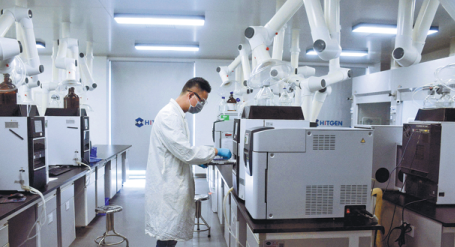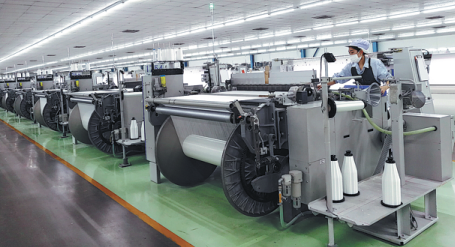Chengdu's tech firms seek further advancement in innovation, growth

The number of tech companies seeking development opportunities saw steady growth in Chengdu, a city known as a hotspot for innovation and entrepreneurship.
A total of 1,036 high-tech enterprises registered in the city in 2019. The yearlong revenue of the local high-tech industry exceeded 930 billion yuan ($131.56 billion), according to a government official.
On June 3, the registration of the initial public offering of Chengdu M&S Electronics on the Shanghai Stock Exchange's sci-tech innovation board, or STAR market, was approved.
A high-tech enterprise developed in Chengdu, it was the third from the city to be listed on the STAR Market this year.
The approval makes Chengdu the city with the largest number of local companies to be listed on the STAR market in Western China.
Founded in 2013, M&S Electronics is a local enterprise engaged in research, manufacturing, sales and technical services in the satellite navigation and satellite communication industry.
The company said it plans to build an industrial base to develop high-end manufacturing and testing equipment in its fields in Tianfu New Area.
"From the perspective of application materials, Chengdu has great potential to embrace bigger development," said Que Bo, deputy general manager of Shanghai Stock Exchange.
Que added that seven Chengdu enterprises have applied for an IPO on the STAR market.
Que said that Chengdu's advantageous industries can extend from electronic information, high-end equipment and biomedicine to new materials, which are consistent with other STAR market industries.
Chengdu has hosted a large number of scientific research institutes, and has strong ability for independent innovation, enthusiasm for innovation and entrepreneurship, rich resources and unlimited potential, Que said.
Recently, Chengdu Fscreen Technology, a company focused on photoelectric display devices, was granted a silver medal of the national Awards for Outstanding Chinese Patented Inventions and Industrial Designs for its manufacturing technology of large-sized Fresnel lens with tapered roller.
According to Luo Ziyun, secretary-general of the Chengdu New Display Industry Association, the technology makes the company the only one to produce Fresnel passive optical screens on laser display devices in large volume in China at present, which is laying a solid foundation for the development of Chengdu's display industry.
"Our core technology is based on the usage of the Fresnel lens principle to produce a large-size passive optical screen for laser televisions," said Zhang Yimin, founder of the company, adding that the company can now produce a 100 inches passive optical screen for laser TVs and its largest size can reach 150 inches in the future.
A large number of enterprises were affected by the COVID-19 pandemic, but the Fscreen Technology saw positive growth on the market.
At present, its large-size laser TV passive optical screens are employed by domestic enterprises such as Xgimi, Xiaomi and Hisense.
In May, the company's new production line was put into operation, which contributed to a big improvement in its production capability.
"We have formed a complete industrial chain from material processing to intelligent terminal application through promoting technology innovation, constructing chain clusters and encouraging industrial integration," a government official said.
They are seizing the opportunities brought by the Chengdu-Chongqing economic circle and striving to build up a good environment to develop the local electronic information industry, the official said. In recent years, the scale of Chengdu's electronic information industry has continued to expand.
According to the government, half of the world's iPad tablets were produced in Chengdu.
And BOE's AMOLED flexible panel production line-the world's second and China's first mass-produced sixth-generation AMOLED full flexible panel production line-is located here.
Top global companies including Huawei, BOE, Intel, IBM, Texas Instruments, and Sumitomo Chemical launched their regional departments in the city.
In 2019, Chengdu's electronic information enterprises above designated scale-with an annual sales revenue surpassing 20 million yuan-achieved an operating revenue of 840 billion yuan, a year-on-year increase of 14.1 percent. According to the city's government report of 2020, Chengdu plans to expand the scale of the electronic information industry to a 1 trillion yuan scale this year. Chengdu has also made remarkable achievements in the advanced materials industry.
In April, the Ministry of Science and Technology announced the latest list of five-star national-level new industry demonstration bases. Chengdu's Qingbaijiang advanced material industrial function zone was selected as the only one in Sichuan province.
JinJin, an official from the Qingbaijiang management committee, said the core technology is the key factor to drive the industrial innovation in the zone. And the evolving of technology benefits from the deep cooperation between research institutions and enterprises.
In early June, Chengdu rolled out new policies to support the industrial innovation. The policies included financial support up to 100 million yuan to those research institutions run under market-oriented operation and built up jointly by leading backbone enterprises and research colleges.





















